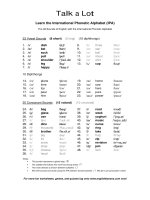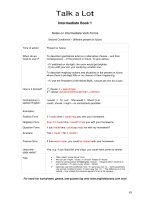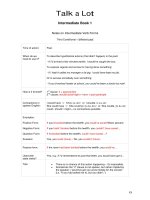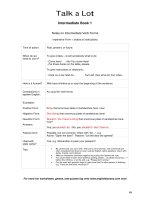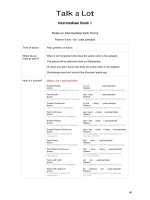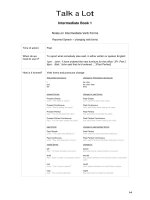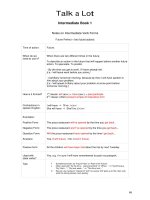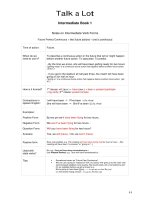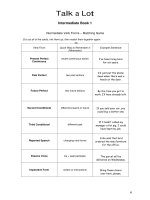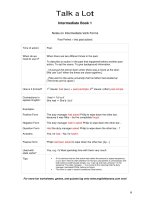talkalot intermediate book 1 imperative form
Bạn đang xem bản rút gọn của tài liệu. Xem và tải ngay bản đầy đủ của tài liệu tại đây (464.85 KB, 1 trang )
Talk a Lot
Intermediate Book 1
Notes on Intermediate Verb Forms
Imperative Form = orders or instructions
Time of action:
Past, present, or future.
When do we
need to use it?
To give orders – to tell somebody what to do:
- Come here! - No! You come here!
- Put those books on the table, please.
To give instructions or directions:
- Cook on a low heat for…
- Turn left, then drive for four miles…
How is it formed?
With bare infinitive at or near the beginning of the sentence.
Contractions in
spoken English:
As usual for verb forms.
Examples:
Positive Form:
Bring that enormous plate of sandwiches here, now!
Negative Form:
Don’t bring that enormous plate of sandwiches here!
Question Form:
Should I / Do I have to bring that enormous plate of sandwiches here,
now?
Answers:
Yes, you should / do. / No, you shouldn’t / don’t have to.
Passive form:
Possible, but not common. Often with “let…”, e.g.
Active: “Open the door!” Passive: “Let the door be opened!”
Used with
state verbs?
Yes, e.g. Remember to pack your passport!
Tips:
•
•
•
•
Be careful who you use it with. The tone is very informal, and commands are
often considered too direct or even rude by English native speakers. Use it with
family, friends, and inferiors!
Make an imperative sentence negative by putting don’t before the verb.
You could make it seem more polite by putting please… or please would you…?
before the infinitive, or at the end, e.g. “Please don’t smoke.”
Can be used with question tags to make sure that the other person is listening,
e.g. “Pass me that book, would you?”
For more fun worksheets, games, and quizzes log onto www.englishbanana.com now!
18
